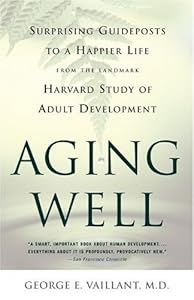 Cover via Amazon
Cover via AmazonI write a lot about adult development. When I took the class in college I never imagined how much pleasure the concept would afford me. I am in the middle of Aging Well by George Vaillant who also wrote Adaptation to Life. Both books draw on the finding of the very significant Grant Study of the Harvard graduates begun the 1942. Their lives were followed with interviews of them and their families and comments and insights by them from 1942 until now. Vaillant has included two other studies of longitudinal importance to his database.
The second set of data comes from the Gluecks' Non-delinquent Controls. In the book this group is referred to as the Inner City Cohort. The data come from a group of matched non-delinquent controls for a study of inner city delinquent youth. The Gluecks last interviewed them in 1960--62. Vaillant obtained the funds to follow them in 1975, and they have returned biennial questionnaires since then.
To provide a female component, Vaillant included date from the study by Lewis Terman conducted at Stanford University on gifted children with IQs 135-140 or higher. In 1987 George Vaillant and his wife Caroline were allowed to re-interview 40 of the surviving women. This study had not required physical exams and health information suffered from this lack.
In his books George Vaillant does a great deal to allay the fear of old age for me. He expands and explores the richer and more abundant resources of life in a new environment. I studied his first book when I was approaching 50, and the study and the book convinced me that to about 65 there was a lot of life to enjoy. It helped me not dread my "golden years." Now I'm past 70, and the gold could be viewed as tarnished or fake, but the truth is I still relish life. Now I'm reading the second book and I've found Gene Cohen, who takes pains to explore stages beyond the Retirement Curtain.
Vaillant and Cohen both describe stages of development that extend beyond the stage Erik Erikson called Generativity vs. Despair. Generativity is the time when we seek to pass on the skills it took us a lifetime to refine. When we have honed a skill, we don't want it to be lost. Generativity may begin in the 50's and 60's, but then like Kolhberg's Stages of Moral Development, it can progress to a higher, more generalized application. Vaillant calls it the Keeper of the Meaning. By the 70's and 80's the family genealogist wants to do more than research; she wants to write and share and relish her family. She wants to become a historian or write a biography. If she has not aged well, she may fall into despair and the vast chasm of aged depression. The task of this stage is care. We care for one another, but with maturity, we also care for our society and our family and our the world at large.
Erikson's final stage is Integrity vs. Despair. The task here is wisdom. Cohen describes a Liberation Phase that may occur in the 60's or early 70's. In those people who have aged well, there may be a new willingness to take risks and an eagerness to express themselves. In this stage the older adults seek to mentor other adults, not necessarily young adults, in how to give of themselves, how to give back. They are mentoring wisdom and how to end well.
I think, and this is a personal opinion, that old people are not so interested in honor or even respect, but they want to know that somebody has taken up their quest, that what they have learned will not be lost. My mother used to say, "Act your age!" I hope she would be glad to see how I am responding to the challenges of getting old.
Related articles

3 comments:
I am sorry to say that but you definitely don't act like your age Gayle. You have a very young spirit with very vivid and fun observations. In my mind I cannot include you in the +70 category. So if a 33 year old can dare and offer you advice, please don't act like you think you should act at this age, but act like you feel. I am sorry I have to contradict your mom :).
Unikorna, you made my day. I'm thrilled to think that you view me as still "vivid and fun." The book informs me that a lot of old people are enjoying the age with vitality and joy. Getting old is getting better!
And wiser. I wish I had more wiser people around me :).
Post a Comment